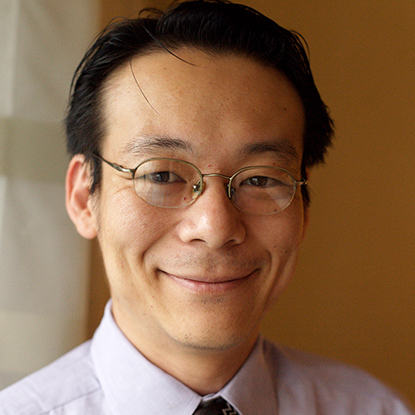Masa Matsumoto Earns Murdock College Research Program Grant

SPOKANE, Wash. — Masa Matsumoto is one of two Gonzaga University researchers who has been awarded the Murdock College Research Program for the Natural Sciences - Physical Sciences grants, along with colleague Wilson Bailey. Masa’s research under the grant will focus on supramolecular chemistry, a discipline of chemistry that understands entities greater than individual molecules. We sat down (virtually) with Assistant Professor Matsumoto to discuss how his research will unfold and how it will impact and involve his students. This article has been edited for brevity.
How will the Murdock College Research grant move you closer towards achieving your goal of bringing together expressed protein fragments?
We are at the stage of validating our initial results. These results suggest that we can control the conformation and oligomerization states of peptides using CB[8] complexation. We will use this opportunity to describe the biophysical behavior of these complexes definitively (how strong the binding is, how selective the binding, is the binding cooperative, the structure of the complex).
The next step would be to construct a proof of concept protein system where we can reassemble two halves of a protein or two parts of a protein dimer and then disassemble them again. Ultimately, we would like to develop a series of tags that self-sort “socially” (A+B) or “narcissistically” (A+A) and orthogonally (A+B and C+D, but not A+C or B+D)
How do you think this research will ultimately impact the work and research students can undertake? Will you be able to bring this work back to the classroom?
The Murdock grant will support two students every summer for three years. This research will have the most impact on students working in the lab on synthesizing and studying these peptide complexes. The development of peptide synthesis and analytical supramolecular protocols has the potential to eventually be introduced into a teaching lab focused on advanced supramolecular chemistry in the long term.
Do you anticipate any interruptions to your research this summer amidst social distancing protocols (coronavirus), or will you mostly be able to achieve your research on your own?
The need for social distancing may likely disrupt some of the planned student research because of the COVID-19 pandemic. However, I will be able to carry out many of the first-year goals on my own.
Is there currently a tool that assembles and disassembles proteins? If so, have you had to rely on that resource to conduct your research?
Assembly and manipulation of proteins using synthetic supramolecular chemistry is a relatively new subject. However, the methods for studying such systems are well-developed; they are the analytical methods of biophysics, biochemistry, and molecular biology. There are already a few limited examples of supramolecular protein assembly in the current literature. We hope that the system we develop will add to the growing toolbox and improve the existing technologies in substantive ways.
What are some potential real-world impacts this research could have?
Despite recent incredible advances in molecular biology and biochemistry, the ability to design and build all but the simplest biologic-like molecules from scratch is sadly beyond reach. There is, therefore, a gap in the spectrum of molecular complexity that we would like to bridge, and we are searching for the tools to do it.
